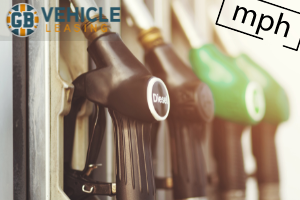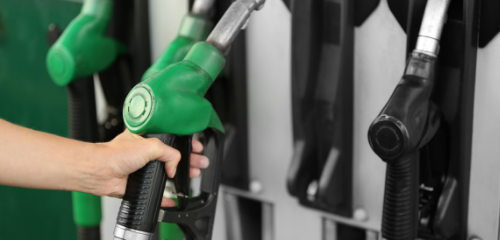
What is MPG?
As the cost of fuel remains high, large volumes are searching the web for cheap cars to run. When choosing a new vehicle, one piece of key information you’ll want to know is the vehicle’s MPG. By choosing a fuel-efficient car, you can considerably reduce your motoring expenses – music to your ears, right?
This article will give you a greater understanding of what MPG means and answer some of the most common questions people have about it when selecting their new lease car.
MPG meaning
MPG stands for miles per gallon and is the unit of measure for a vehicle's fuel efficiency, also known as fuel economy. Essentially, it shows the distance your vehicle can travel for each gallon (equates to approx. 4.55 litres) of fuel it uses. For example, if on average your car achieves 45mpg, it means it will cover 45 miles per gallon of fuel. It's important to note that a vehicle’s MPG score is only an estimate and therefore should only be used as a guideline. There are several factors that can impact mpg in cars.

What is the Importance of MPG?
Firstly, MPG in cars is important as the higher the MPG, the more fuel efficient the car is. This means less fuel is used as you're driving and so it costs less the run the car. To show how much more mileage you get for less money, let's compare a gas-guzzler and a fuel-efficient car, based on 12,000 miles per annum. If one car gets 30mpg and you pay £1.65 per litre, this translates to £3,000 annually. On the other hand, if you are operating a fuel-efficient car that gets 50mpg at £1.65 per litre, you are spending only £1,800 annually. Therefore, this example shows you are making significant savings and getting better mileage. As fuel costs remain high, MPG is as important as ever, so when looking for a new lease vehicle, this is one factor which you might want to consider.
Also, cars with a high miles per gallon rating and low CO2 emissions are typically greener cars. The less fuel a car consumes, the less smoke it emits through its exhaust. The tailpipe emissions from fuel-efficient cars are lesser than from ordinary cars, so damage to the atmosphere is significantly less.
Now you may be wondering, "what is a good mpg?" Well, there isn't an exact figure for a 'good mpg', but generally, any new car with an MPG figure of over 50 miles per gallon is considered a fuel-efficient car. Whereas for a used car, an MPG figure above 40mpg is considered reasonable.
How is MPG calculated?
WLTP (Worldwide Harmonised Light Vehicle Test Procurement) testing is used to measure how economical a vehicle is, by measuring 3 things - Fuel consumption, CO2 emissions and Pollutant emissions. WLTP uses real-driving data and should therefore be more accurate as the test is based on normal driving styles. However, no two drivers have the exact same driving style, so it isn't possible for the tests to cover every possible variation of driving style.
If you want to measure your vehicle’s MPG, follow the steps below:
Fill your tank to the maximum limit and zero the trip counter
Next time you fill your tank, note how many miles you’ve covered since last refuelling and how many litres of fuel has been used
Divide the number of miles driven by the amount of fuel used in litres, then translate this figure to miles per gallon by multiplying it by 4.55
An example calculation could be:
360 (miles) / 40 (litres) = 9 miles per litre
Then 9 x 4.55 = 40.95 MPG

MPG Explained
What is urban MPG?
Urban MPG relates to a car's efficiency during city driving. This involves testing the car's MPG with slow, stop-start driving.
What is extra urban MPG?
Extra urban MPG measures the vehicle's efficiency on country roads and motorways. This reflects fuel consumption whilst driving at higher average speeds and longer distances.
What is combined MPG?
Combined MPG represents a combined average of urban and extra urban driving. This will measure the vehicle's efficiency based on a combination of road types - town, country, motorway. When looking for a fuel-efficient car, most drivers will mainly consider the combined MPG of the vehicle.
Which Factors Affect MPG?
Firstly, your driving style can impact the fuel economy of your car. Statistics suggest that driving behaviours such as rapid acceleration, speeding and sharp braking could reduce the vehicle MPG by up to 40%. If your car has cruise control, then this can be good to use. Also, vehicle maintenance is important as parts such as improperly inflated tyres can decrease your vehicle’s fuel economy. Regular tune-ups and maintenance are necessary in order to ensure your vehicle runs smoothly and prevent costly problems down the road. Plus, fuel variations can impact fuel MPG as fuels contain different amounts of energy.
Another point to be aware of is that using electrical accessories such as air conditioning and heated seats could lower fuel economy by up to 25%. Therefore, only using these electrical accessories when most necessary could help you to save fuel when driving. Furthermore, cold weather is another factor that affects MPG. When it’s cold or windy, aerodynamic resistance is greater which results in your car using more fuel.
What is the best mpg car?
There's no straightforward answer to this question as it depends on various factors such as the car's bodystyle, fuel type and your budget. However, if you're looking for a petrol car, the Peugeot 108 is worth considering with a fuel efficiency rating of up to 58.9mpg (WLTP-combined). This small Peugeot model is very similar to the Citroen C1, however the Peugeot 108 stands out for its styling. Furthermore, all engines for the 108 are petrol units. Alternatively, if you'd prefer a diesel car, then take a look at the Vauxhall Corsa Diesel Hatchback. This has a fuel efficiency rating of up to 70.6mpg (WLTP-combined) and is famous for its reliability and dependability.
What is a good mpg for a suv?
The fuel economy rating of SUVs is often much lower than the ratings given to smaller vehicles and city cars, simply because larger vehicles need to use more fuel to get around. With that said, there are still some SUVs available with a fuel efficiency rating above 50mpg. Keep in mind that, due to the size of SUVs, many of the most fuel-efficient models are hybrids. With that said, the Toyota RAV4 has a good mpg rating of up to 57.6mpg, thanks to its efficient hybrid powertrain. This spacious five-seater vehicle offers plenty of headroom and legroom to its driver and any passengers, as well as a generous 580-litre capacity boot. Alternatively, the Ford Puma is another great option. Available with front-wheel drive, its engine line-up consists of 125hp and 155hp, 1.0-litre EcoBoost petrol engines with mild-hybrid technology for improved fuel-efficiency.
Is cruise control more fuel efficient?
Cruise control can increase fuel economy as it enables you to maintain a constant speed by fixing the car's accelerator on a set speed. However, the extent to which cruise control can improve fuel efficiency may depend on a few factors, including the driving conditions, the specific design of the vehicle, and the behaviour of the driver. It ideally requires you to be driving on a flat surface and without traffic disruptions. This makes it best suited for motorway driving as the need for constant change in acceleration and deceleration is usually limited.
It is also important to note that while cruise control can help to improve fuel efficiency, it is not a substitute for safe and responsible driving habits. Drivers should always be aware of the road and other vehicles around them, and adjust their driving accordingly, even when using cruise control. Click here to find out more about cruise control, including the advantages and limitations of this feature.
Is E10 fuel less efficient than E5?
Under Government plans, UK fuel stations began selling greener E10 petrol as the standard petrol grade. This has been designed to cut vehicle emissions. E10 petrol consists of 90% regular unleaded and 10% ethanol. This is 5% more ethanol than in E5 petrol – hence the name. The majority of petrol-engined vehicles on our roads are compatible with E10. E10 petrol can marginally reduce fuel economy as it has a lower energy content than E5. Although, the difference is considered barely noticeable and the exact difference in fuel efficiency may vary depending on the vehicle's engine and other factors such as driving habits and road conditions.
Does start-stop technology improve fuel efficiency?
Yes, start-stop technology is now installed on most new vehicles and can be a good way to improve fuel efficiency. Start-stop is an automatic system which shuts down and restarts the vehicle's engine when you're stationary for more than five seconds e.g. at traffic lights.This reduces the period of time in which the engine is idling and in return improves fuel consumption and lowers emissions, particularly in urban driving conditions where there are frequent stops and starts. In fact, some studies have found that start-stop technology can improve fuel efficiency by up to 5-10%, depending on the specific driving conditions and vehicle design.
Hybrid Cars
Have you considered hybrid car leasing? Hybrid cars can offer the driving performance (and experience) of a combustion engine coupled with enhanced economy. For those with urban-style driving conditions, the electric element will assist where there are low speeds. Plus, as hybrid cars can use less fuel to run, they are less dependent on fossil fuels. With the rising price of fuel, drivers of hybrid cars can take this as a little win. If you'd like a greener form of transport but don't think a full electric car is right for you, then there’s an excellent choice of hybrid vehicles available instead. Click here to find out more about the benefits of leasing a hybrid car.
Hybrid cars work by combining a gasoline engine with an electric motor. The electric motor is powered by a battery that can be charged by the gasoline engine or by using regenerative braking. The hybrid car technology is more efficient than traditional cars and offers better fuel efficiency, as well as lower emissions. Popular examples of hybrid cars include the Toyota Rav4, Kia Niro (hybrid) and Lexus UX. For more information about hybrid cars, contact our hybrid specialists on 0161 667 5338.
We hope you’ve found this article useful in exploring what MPG means. For more guides and news relating to cars, follow us on Facebook. Time for a new car? Investing in a fuel-efficient car will, in the long run, prove beneficial not only to you but to the environment at large. If you're unsure what fuel-efficient car you want, view our articles below for inspiration on the most efficient cars, SUVs and small cars. We've got options for everyone from the budget-minded to the environmentally conscious.
Latest Posts

Discover Your Perfect Halloween Car Match
Find Your Halloween Ride: Which Spooky...

Jeep Avenger Review 2024
Meet the Jeep Avenger, the brand’s...

A Comprehensive Kia Stonic Review
See for yourself if this could...

Cheap Vans to Lease 2024
Let's explore some of the cheapest...

Exploring Excellence: Isuzu D-Max Review 2024
In this Isuzu D-Max review, we'll...


































